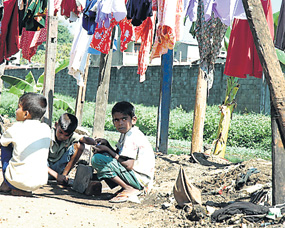
Let’s alleviate poverty the Bangladesh wayPoverty alleviation continues to be an acute problem in Sri Lanka, despite the efforts of the government and private organisations over the years. The micro-management of finances is one approach that has been adopted to tackle this problem. However, this approach has not yielded the desired results. It is now five months since Nobel Peace Prize winner Professor Muhammad Yunus of Bangladesh visited Sri Lanka and delivered two important speeches on poverty alleviation. On both occasions, it was a packed audience that waited to hear his thoughts on the subject.
Prof. Yunus pointed out that Bangladesh, where poverty has long been an overwhelming problem, has succeeded to a large extent in eliminating some of the country’s poverty – through dedication and commitment. It appears that this success is largely the result of a single person’s sacrifice on behalf of the underprivileged and those who have suffered for generations. Prof. Yunus has overcome huge obstacles in his efforts to alleviate poverty in his country. When banks refused to grant loans to the poor for lack of reliable security, Mr Yunus came forward and offered himself as a reliable guarantor. Very soon, he was able to change the pattern of loan grants in his country by introducing quick and easy methods to obtain loans. Prof. Yunus himself began to grant loans to the poor. The documentation for his loans was simple and did not emphasise repayment and interest rates. The professor soon discovered that his loans were being repaid on time. Shortly after, he started the Grameen, or Village Bank, which granted loans in a similar way. Loans were given so that poor families could set up income-generating micro-enterprises. He introduced a system of handing over loans at the applicant’s doorstep. This was particularly welcome in the case of female householders. Prof. Yunus also observed that it was the women who brought the most benefits to the family. In addition, a team of volunteers from the bank would visit these households to advise on the proper use of loans. All these efforts eventually paid off, as repayment was regular. Grameen Banks soon became very popular, and the result was that similar banks opened in all parts of the country. Gradually, the unique loan system spread to cover other areas of need, such as general education and higher education and also small business ventures. Poverty exists largely because of a wrong interpretation of capitalism, which is largely profit-oriented, Prof. Yunus said. He found that the secret to helping poor people was to avoid stressing the maximisation of profit. This philosophy resulted in the emergence of two types of business: those that maximized on profits, and those that could be considered “social business”. Social business is important because it concerns mankind’s most vital needs. The Grameen Bank focuses largely on social business, in which the investors themselves become partners and do not accept dividends. Social business management aims to create the non-loss, non-dividends company. This approach to business can change the life patterns of a large percentage of the world’s poor and help them overcome their poverty. Sri Lanka should emulate Bangladesh and adopt this unique business approach in its efforts to eliminate poverty. |
|
||||||
|| Front
Page | News | Editorial | Columns | Sports | Plus | Financial
Times | International | Mirror | TV
Times | Funday
Times || |
| |
Reproduction of articles permitted when used without any alterations to contents and a link to the source page.
|
© Copyright
2008 | Wijeya
Newspapers Ltd.Colombo. Sri Lanka. All Rights Reserved. |
